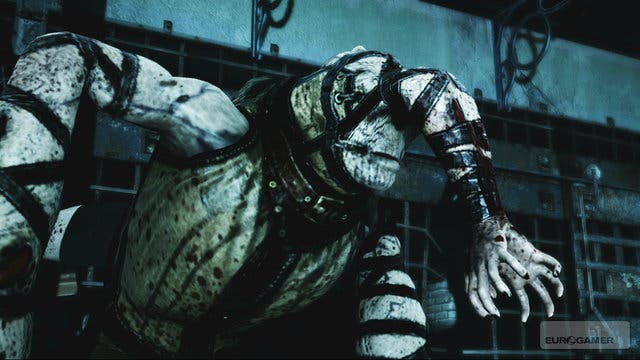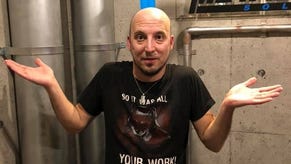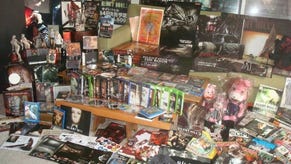Silent Hill Homecoming
Shepherd's delight?
On the whole, though, while the combat infuses a suitable amount of tension, it's tension borne out of never feeling quite in control, rather than anything particularly clever. Once you adapt to the stiff aiming and predictable attack patterns, you realise most of the monsters are not only quite dim-witted, but not all that tough to beat. And whether or not you buy into the idea of controls deliberately crippled to amp up the fear factor, we can probably all agree that old-fashioned save systems that involve trudging around for ages should be locked in a cellar and left to die.
Another minor disappointment is how the game looks. When Silent Hill 2 shambled onto PS2 in 2001, it was one of the best-looking games ever, with incredible facial detail and an artistic style that set an impressive benchmark. Double Helix barely matches it, falling short in the same ways Origins did. The environments are alright, with richly detailed, disgusting grime and devastation at every turn, but when it comes to modelling human faces, Homecoming is so far off the techniques Team Silent developed that it's hard not to be disappointed. Instead of beautifully rendered avatars during narrative moments, we're served close-ups of characters rendered in-engine, who are nowhere near as striking. Lip-synching techniques and transitional animations could both be better, and overall it simply looks a bit rushed.
By contrast, most of the monsters in the game are obscenely excellent, with all manner of grim apparitions delighting in their hideousness. But for every positive, Homecoming harbours another slight disappointment. One of the most crucial elements of any Silent Hill game is the characterisation and narrative, and sadly it never finds its feet. Alex Shepherd's search for his brother has potential, but you never feel the same sense of bewilderment and intrigue that made previous Silent Hill titles so otherworldly. If anything, the main criticism of the story is that it plays it too safe. Before you've even got to know several characters, they're slain by hideous monsters before your eyes. It lacks the subtlety of old.
The resolutely linear nature of the gameplay, as well, is a throwback. There are so many possibilities for a Silent Hill game set in a more expansive environment with multiple threads running concurrently, with a more fleshed-out cast, but that's never the case here. Instead, Shepherd's Glen is not only smaller than previous Silent Hill environments, but less interesting. The number of locations feels reduced, and therefore the capacity for the game to surprise the player is lessened as well. It's too stripped-down for its own good.

Fortunately, the audio remains as resolutely excellent as ever. Akira Yamaoka contributes more than 70 minutes to the game, and retains an atmosphere as oppressive as you'll find. As well as his trademark guitar-lead pieces, some of the more mind-warping compositions create an almost unbearable ambience. Some top-quality voice-acting also carries Homecoming through sections where the game itself is treading water - or just retreading old ground.
Konami has taken a big risk in turning one of its most treasured series into a franchise property, and it's hard to be too critical of Double Helix for essentially doing what it was commissioned to do, because Homecoming respects the legacy and approximates the things fans want. But in the same way you wouldn't accept Metal Gear Solid or Pro Evolution Soccer taken from Kojima Productions or Konami TYO and given to a contractor with no background working on them, Silent Hill fans won't be thrilled about this. Maybe Team Silent is quietly beavering away on something new, which is going to blow us away again, but until then horror fans must make do with this fairly decent cover version.










